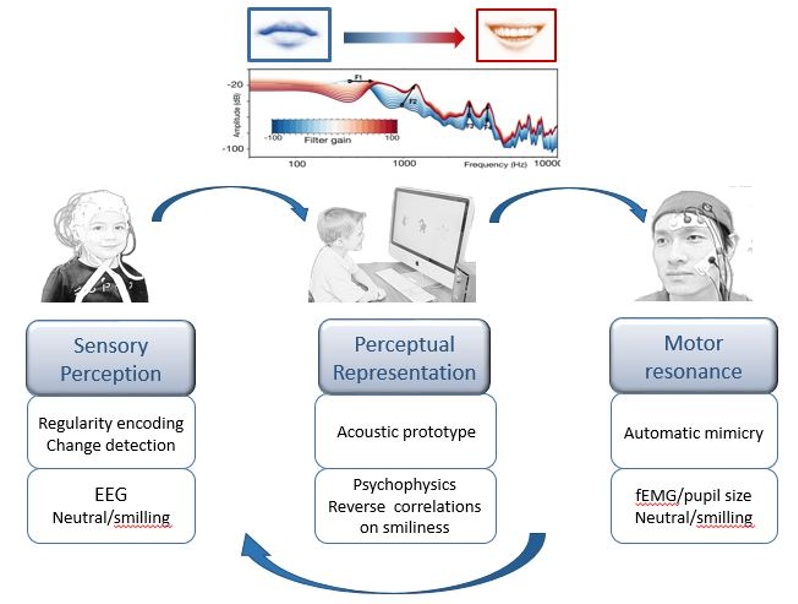Sensory And Emotional Processing in Autism
ANR AAP-PRC 2019
Sensory and Emotional Processing In Autism spectrum disorders - SEPIA
- Presentation of the project and objectives
Autism spectrum disorder (ASD) diagnosis requires both symptoms of socio-emotional impairments (e.g. not responding to smiles) and repetitive behaviors/restricted interests (e.g. not reacting to changes or regularities in the environment in a typical way). While both aspects are clearly prone to interact (e.g. how could one react to smiles if one doesn’t attend to changing facial expressions), little research has attempted to integrate them: whether difficulties in ASD are related to specifically-emotional deficits, to sensory particularities which are even more marked for social stimuli, or both, still remains to be established. Using smiling voice as an experimental model, project SEPIA (Sensory and Emotional Processing In Autism spectrum disorders) proposes to explore all three major steps of the emotional Perception-Representation-Action loop (Sensory processing - Perceptual representation - Motor resonance) in the same children and adults participants. At the sensory level (WP1), the project will study brain correlates of auditory regularity encoding and change detection in ASD, and how these depend on the emotional nature of the information. To do so, we will use a new electrophysiological (EEG) ‘roving’ paradigm in which participants will be presented with trains of repeated smiling or neutral voices, while we measure Repetition-Suppression (RS) and mismatch (MMN) responses. At the perceptual representation level (WP2), the project will provide a full characterization of how ASD participants internally represent the spectral signature of smiled speech, and how these representations depart from controls. To do so, we will use a recent ‘reverse-correlation’ paradigm in which participants are asked to evaluate the ‘smiliness’ of voice recordings algorithmically manipulated to have random spectral content, and their responses are reverse-engineered to find what spectral information correlates with their judgements. Finally, at the motor resonance level (WP3), the project will study the mechanisms by which vocal smiles evoke automatic facial and autonomic reactions, and how these may be affected in ASD. To do so, we will use a novel facial electromyography (EMG) paradigm, combined with pupillometry, in which participants listen to vocal expressions experimentally manipulated to be smiling or non-smiling, while their own zygomatic and pupil reactions are monitored. Most importantly, by assessing all three steps of the perception-representation-action chain in the same participants, project SEPIA offers the unique potential to identify their respective interactions in ASD sensory and socio-emotional difficulties, e.g. whether potential deficits in regularity processing (WP1) correlate with atypical perceptual representations (WP2), or whether facial mimicry (WP3) is facilitated for stimuli that are prototypical of a participant’s perceptual representation. This integrative approach, made possible by the combined expertise of INSERM UMR1253 for clinical and EEG research and CNRS-IRCAM for innovative psycho acoustical techniques, therefore provides a rare opportunity to disentangle sensory and emotion-related processes in ASD, to determine at which level physio-pathological processes operate, and to provide novel mechanistic insights into the socio-emotional difficulties at play in autism. These outcomes will be key to define precise targets for behavioral and cognitive therapies and educational interventions tailored to each subgroup of patients.

- Main people involved
For more informations, please contact the scientific coordinator of the project,
Marie GOMOT : gomot@univ-tours.fr
Tel : 0247478664
Inserm iBrain - Centre de Pédopsychiatrie - CHRU Bretonneau
2 Boulevard Tonnellé - 37044 TOURS Cedex 9
Duration : 46 mois
Funding allocated to the project: 360 000 euros
- Contact
For more informations, please contact the scientific coordinator of the project,
Marie GOMOT : gomot@univ-tours.fr
Tel : 0247478664
Inserm iBrain - Centre de Pédopsychiatrie - CHRU Bretonneau
2 Boulevard Tonnellé - 37044 TOURS Cedex 9



